What Is a Scrum Master? Key Roles & How to Become One in 2025
Read our in-depth guide on how to become a Scrum Master, what it means to be one, and the skills required for successful Agile project management in this position.
Key Takeaways: Scrum Master
- A Scrum Master is a facilitator and servant leader of the Agile project management methodology who ensures the effective implementation of the Scrum framework, promotes collaboration and removes obstacles to help Agile teams achieve project success.
- Core skills for a Scrum Master include a deep understanding of the Scrum framework, strong facilitation and communication skills, adaptability and the ability to foster a culture of continuous improvement.
- Obtaining a Scrum Master certification, such as CSM or PSM, can enhance your professional credibility, validate your knowledge and skill, and increase your marketability in Agile project management. Practical experience and ongoing learning are equally important for long-term success as a Scrum Master.
A Scrum Master plays a crucial role in the Agile project management framework. They are responsible for facilitating effective communication and collaboration within the team, removing any obstacles that hinder progress and ensuring the team follows Agile principles and practices. To learn more about agile, refer to our what is Agile guide.
The journey to becoming a Scrum Master includes critical steps such as understanding the Scrum framework, acquiring Agile knowledge and using Scrum software. You’ll also develop soft skills, obtain a Scrum Master certification and gain practical experience through Scrum Master jobs.
Keep reading this comprehensive guide to discover how you can become a Scrum Master, what the role entails and the best certifications to get you there.
What Does a Scrum Master Do?
A Scrum Master’s primary responsibility is to facilitate and support the implementation of Agile principles and practices within a team. They act as a project leader, guiding the team through the established Scrum framework to ensure smooth collaboration, continuous improvement, and the delivery of high-quality projects.
A Scrum Master is in charge of removing any obstacles that may hinder the team’s progress, whether they are related to resource allocation, stakeholder communication or any other factors that may impact the team’s ability to deliver. This also involves organizing and facilitating daily stand-up meetings, sprint planning sessions, sprint reviews and retrospective meetings.
Some common challenges faced by Scrum Masters include managing stakeholder expectations, fostering a self-organizing team culture and encouraging adherence to Agile principles. Balancing the needs and priorities of stakeholders while staying true to Agile values can be a delicate task. Moreover, adapting to changing circumstances, resolving conflicts and promoting a culture of continuous improvement is no easy feat.
However, by actively addressing these challenges, a skilled Scrum Master plays a vital role in creating a collaborative and productive environment to facilitate a team’s success.
Common Roles and Responsibilities of a Scrum Master
Here are some of the responsibilities Scrum Masters take on daily. However, keep in mind that the specific responsibilities may vary depending on the organization, project and team dynamics.
- Facilitating Agile practices — Guide the team in implementing and adhering to Agile principles and methodologies like sprint planning, reviews and retrospectives.
- Removing impediments — Identify and eliminate any obstacles that hinder the team’s progress.
- Team collaboration — Foster a collaborative and self-organizing team environment, promoting effective communication, collaboration and decision-making among team members.
- Coaching and mentoring — Provide guidance and support to team members, product owners and stakeholders in understanding and adopting Scrum principles.
- Continuous improvement — Encourage retrospective thinking to identify areas for enhancement and implement changes to optimize processes and outcomes.
- Metrics and reporting — Collect and analyze data on team performance and progress.
- Servant leadership — A Scrum Master serves as a servant leader, placing the needs of the team above personal interests and empowering them to achieve their goals.
- Conflict resolution — Mediate and resolve conflicts within the team or with external parties, promoting a harmonious and collaborative work environment.
Essential Scrum Master Skills
Certain skills are a must-have for effectively fulfilling the role and driving successful Agile project management. Among the most important skills for Scrum Masters are strong communication and leadership abilities.
Effective communication ensures smooth collaboration among team members, stakeholders and product owners, while leadership skills help create an environment conducive to open dialogue and effective decision-making. The concept of servant leadership, which revolves around inspiring and motivating teams toward achieving project goals, is also at the crux of being a Scrum Master.
In addition to the core skills mentioned above, here are some others that are also essential to a strong Scrum Master:
- Adaptability and flexibility to embrace and navigate changing project requirements and circumstances.
- Problem-solving and conflict resolution skills to identify and address impediments, as well as facilitate productive discussions and resolutions.
- In-depth knowledge of Agile methodologies and the Scrum framework, including best practices and iterative development techniques.
- Facilitation of continuous improvement and the ability to foster a culture of learning and growth.
- Stakeholder management and influencing skills to effectively engage and align critical parties throughout the project.
Average Scrum Master Salary
The salary of a Scrum Master can vary depending on factors such as experience, location, industry and the size of the organization. According to the 2023 Scrum Master Salary Report, the median annual wage for Scrum Masters globally was $80,995 as of September to December, 2022.
It’s worth noting that Scrum Masters often work in the realm of Agile project management, which encompasses a broader range of roles and responsibilities beyond traditional project management. As such, salaries for Scrum Masters can vary and may be influenced by factors specific to the Agile industry.
Factors such as the level of experience, additional certifications, and the organization’s maturity in adopting Agile practices can also influence the salary. To get the most accurate picture and up-to-date salary information for Scrum Masters, we recommend you consult with human resources professionals or recruiters specializing in Agile project management roles.
How to Become a Professional Scrum Master
Becoming a professional Scrum Master involves a series of steps that equip you with the knowledge, skills and certification necessary to excel in this role. Let’s explore the key steps below.
Step 1: Understanding the Scrum Framework and Fundamentals
Start by gaining a solid understanding of the Scrum methodology and Agile principles. Familiarize yourself with the roles, ceremonies and artifacts involved in Scrum. Explore the principles and values that underpin Agile project management and the benefits it brings to teams and organizations.
Numerous resources, including books, online courses and tutorials, can provide you with a comprehensive understanding of Scrum’s core concepts and how they apply in real-world scenarios.
Step 2: Acquiring Agile Knowledge and Using Scrum Software
Expand your knowledge beyond Scrum and delve into other Agile methodologies, such as Kanban, Lean and XP. Understand how these methodologies complement Scrum and explore their practical applications.
Additionally, familiarize yourself with popular Scrum software tools that facilitate Agile project management, such as Jira and Trello. Practical experience with these tools can enhance your effectiveness as a Scrum Master.
Step 3: Developing Soft Skills
It’s important to cultivate essential soft skills to excel as a Scrum Master. Strengthen your communication, facilitation and leadership abilities. Foster effective collaboration, active listening and empathy within teams. Also, work on refining your conflict resolution skills to navigate challenges that arise during projects.
By developing strong soft skills, you create an environment that fosters trust, encourages open dialogue and empowers team members to achieve their best.
Step 4: Obtaining a Scrum Master Certification
Consider obtaining a Scrum Master certification to validate your knowledge and enhance your professional credibility. Certifications such as Certified ScrumMaster (CSM) or Professional Scrum Master (PSM) are widely recognized and respected in the industry.
Prepare for the certification exam by studying the relevant material, attending training courses and practicing with sample questions to ensure success.
Step 5: Gaining Practical Experience
Seek opportunities to gain practical experience as a Scrum Master or in Agile project management roles. Actively participate in Agile projects within your organization or through volunteer work to apply your knowledge in real-world scenarios.
Embrace the challenges and learnings that come with leading Agile teams, resolving impediments and delivering successful outcomes.
The Top 5 Scrum Master Certifications
Becoming a certified Scrum Master can significantly enhance your credibility and demonstrate your expertise in Agile project management. Here are some of the top Scrum Master certifications.
Certified ScrumMaster (CSM)
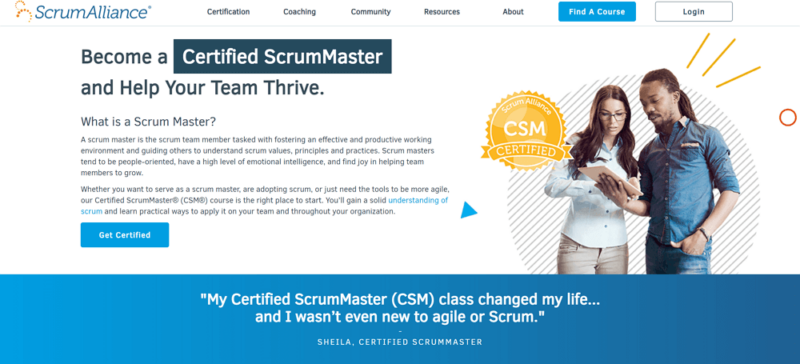
The Certified ScrumMaster (CSM) certification, offered by the Scrum Alliance, is one of the most widely recognized and popular Scrum Master certifications. This certification validates your understanding of the Scrum framework, roles, ceremonies and Agile principles.
To earn the CSM certification, you need to have at least 14 hours of training under your belt by a certified Scrum trainer and pass an online exam. The CSM certification demonstrates your commitment to continuous learning and equips you with the knowledge to effectively guide Scrum teams.
Professional Scrum Master (PSM)
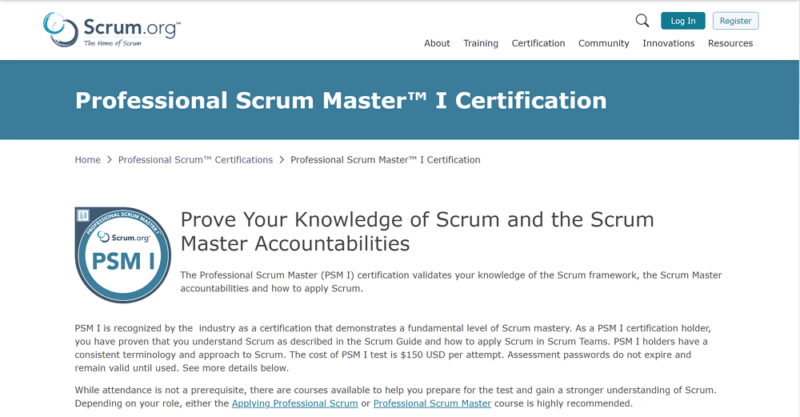
The Professional Scrum Master (PSM) certification, provided by Scrum.org, is another highly regarded certification for Scrum Masters. It offers a series of certifications at different levels, including PSM I, PSM II and PSM III. Each level assesses your knowledge and competency in the Scrum framework and Agile practices.
The PSM I certification requires passing an online exam with a score of at least 85% to be certified. It tests your understanding of Scrum theory, empirical process control and servant leadership. Achieving PSM certification demonstrates your proficiency as a Scrum Master and your ability to apply Scrum principles effectively.
Professional Scrum Product Owner I (PSPO I)
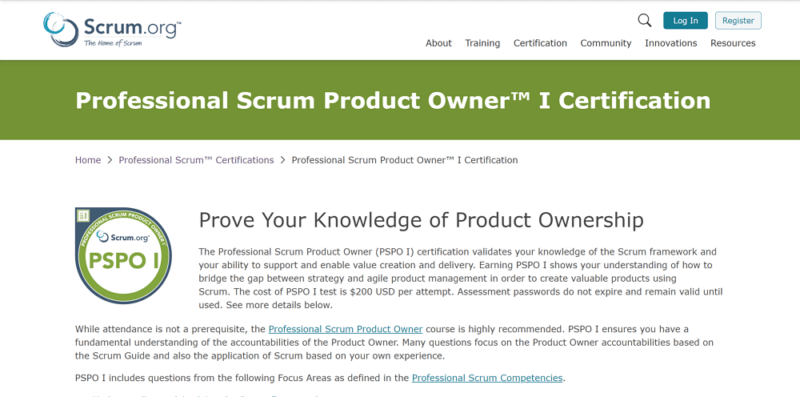
The Professional Scrum Product Owner I (PSPO I) certification, offered by Scrum.org, is specifically designed for professionals who want to specialize in the role of a product owner within Scrum teams. This certification focuses on developing a deep understanding of the product owner’s responsibilities, techniques and skills to effectively manage the product backlog and maximize value delivery.
The PSPO I certification assesses your knowledge and competency in critical areas such as product vision, release planning, backlog refinement, stakeholder management and prioritization. To earn the PSPO I certification, you need to demonstrate your understanding of Scrum principles and product ownership through a rigorous online assessment.
SAFe Scrum Master (SSM)
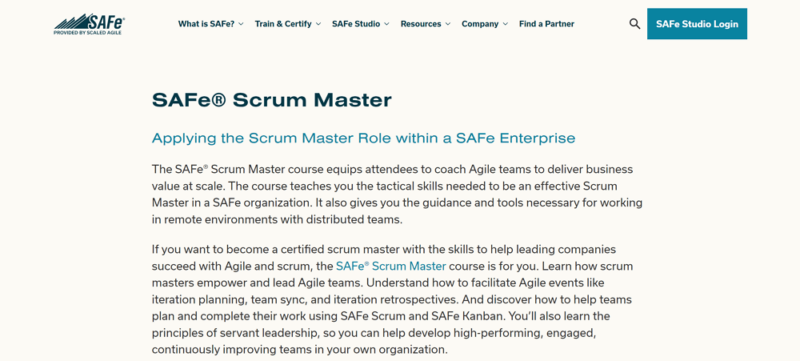
The SAFe Scrum Master (SSM) certification, provided by Scaled Agile, is specifically designed for Scrum Masters working at the enterprise level who are curious to know how it integrates with the Scaled Agile Framework (SAFe). You have to pass the exam as well as take a two-day course by Scaled Agile to get the certification.
The SSM certification equips you with the knowledge and skills to lead Agile teams, facilitate program execution and apply Agile and Lean principles in large-scale organizations. It validates your ability to effectively navigate the complexities of implementing Scrum within a broader Agile framework.
Certified Scrum Developer (CSD)
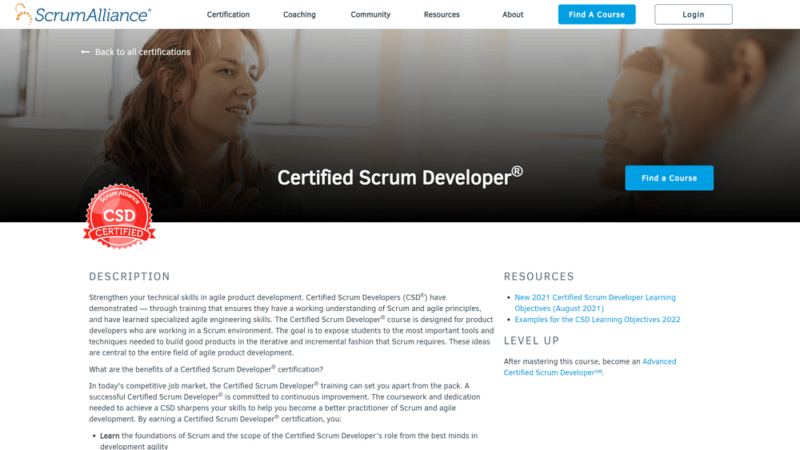
The Certified Scrum Developer (CSD) certification, offered by the Scrum Alliance, is designed for software developers and technical professionals who work in Scrum teams. While not specifically a Scrum Master certification, obtaining a CSD certification can significantly benefit Scrum Masters who come from a technical background or work closely with development teams.
The CSD certification, which requires you to take a course over two days, focuses on the technical aspects of Scrum and emphasizes collaboration, coding practices and Agile engineering techniques.
It equips participants with a solid understanding of Agile development principles, test-driven development (TDD), continuous integration (CI) and other practices that contribute to the successful delivery of high-quality software products within a Scrum framework.
Final Thoughts
Becoming a Scrum Master is a rewarding and fulfilling journey that requires a combination of knowledge, skills and practical experience. Remember that the journey doesn’t end with certification. It is essential to continue learning, adapting and growing as the Agile landscape evolves.
As a Scrum Master, you play a vital role in fostering an environment of continuous improvement, open communication and teamwork. You’ll need to embrace the opportunity to collaborate with diverse teams, overcome challenges and drive successful project outcomes.
We hope this guide has provided valuable insights and guidance on how to become a professional Scrum Master. If you have any questions or would like to share your thoughts and experiences, please leave a comment below. We would love to hear from you and continue the conversation.
Best of luck on your journey to becoming a successful Scrum Master, and may you bring the power of Agile project management to your teams and organizations. As always, thank you for reading.
FAQ: Scrum Master Explanation
A Scrum Master is responsible for facilitating the Scrum process, ensuring adherence to Scrum principles, removing obstacles and promoting collaboration within the team to achieve project goals.
No, a Scrum Master and a project manager have different roles. While project managers focus on overall project planning, execution and delivery, a Scrum Master focuses on facilitating the Scrum framework and supporting the Scrum team.
Scrum Masters can be well compensated, but salaries vary depending on factors such as experience, location, industry and organization size. Obtaining relevant certifications and gaining practical experience can positively impact earning potential.
Yes, a Scrum Master certification is worth pursuing as it validates your knowledge, enhances your credibility and opens up opportunities in the field of Agile project management. However, practical experience and continuous learning are also crucial for success as a Scrum Master.


